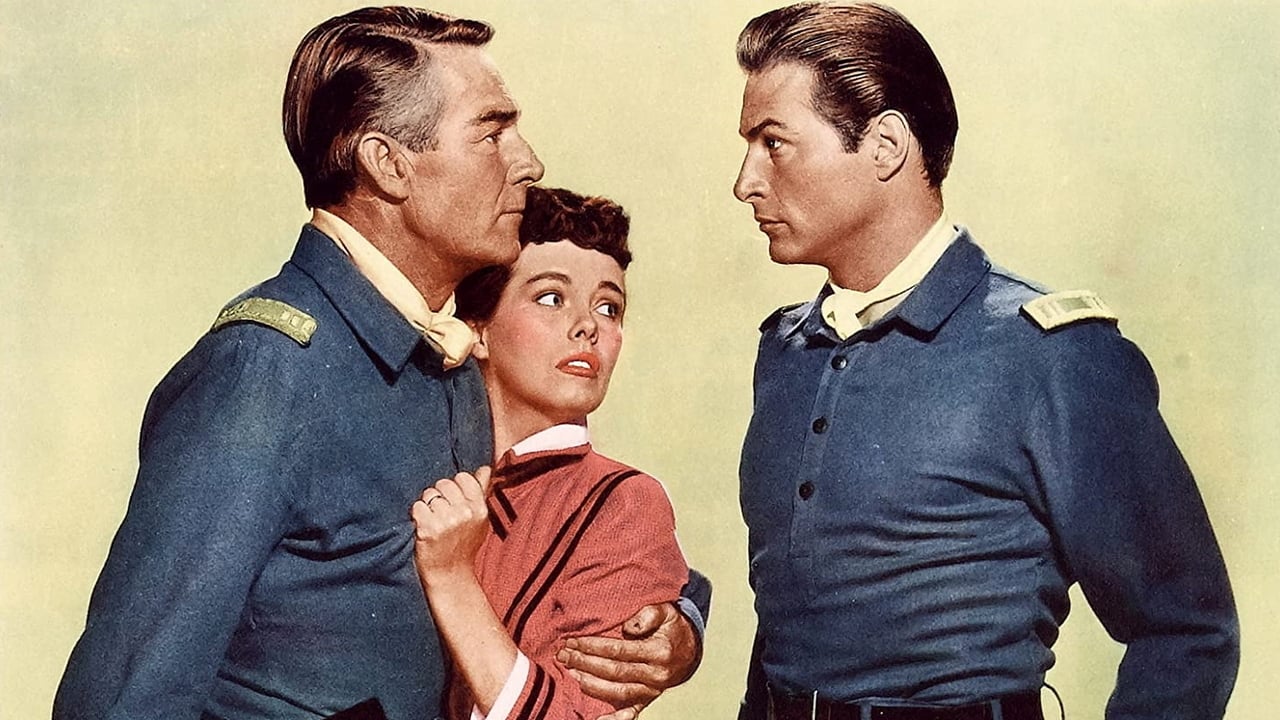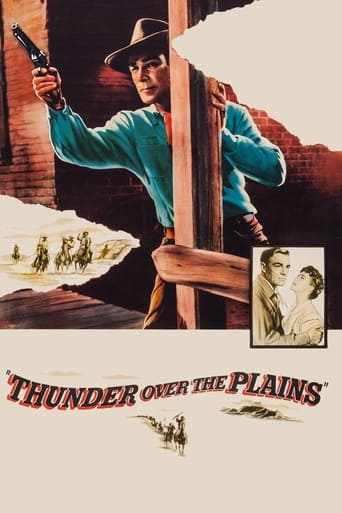

In post Civil War Texas, an Army captain is charged with bringing in an outlaw who has become a legend for taking on the Carpetbaggers. It begins and ends with hokey narration, but in between there is a fairly interesting story, helped by nice color cinematography. Scott is his usual solid self as the captain. McGraw plays the outlaw, but it is Barker (coming off his final Tarzan movie) as another Army captain that is the real villain here. Kirk does well as Scott's understanding wife. It's not up to the level of Scott's later Westerns with Budd Boetticher, but it's competently directed by de Toth. The final gunfight is too drawn out and somewhat anti-climactic.
... View MoreThunder Over The Plains is directed by André De Toth and written by Russell S. Hughes. It stars Randolph Scott, Lex Barker, Phyllis Kirk, Charles McGraw, Henry Hull & Elisha Cook Jr. Filmed in WarnerColor the exterior photography is by Bert Glennon at the Warner Ranch in Calabasas, and David Buttolph scores the music.It's 1869, and Texas is still not part of the Union. Carpetbaggers rule the state and criminal activity is high. Captain Porter (Scott), a proud Texan himself, finds he has to carry out orders against his own countrymen. When a man in town is murdered in cold blood, suspicion falls on rogue cowboy Ben Westman (McGraw), but Porter believes he's innocent and strikes a deal to bring him in for a fair trial. However, this sets off a chain of events that leads to Porter himself becoming a wanted man.Knowing direction, fine acting and a darn good script, all make Thunder Over The Plains essential viewing for the 50s Western fan. The bonus, aside from the impressive support cast, is the story itself. This was a troubled time, a time when only two states were not yet accepted back into the Union post the Civil War. Toth and Hughes paint a murky town, one of corruption, tax oppression and shifty shenanigans. There's even room in the story for strains on the family home of Porter and an attempt at adultery. Throw in the nice colour and scenery, pace it briskly with enjoyable action set-pieces (the shoot out at the end is familiar but excellently done), and it's a fictionalised winner. 7/10
... View MoreRandy is in a complicated situation. He is a Captain(Porter) in the Union occupational army in Reconstruction Texas. But, he is a Texan himself, although pro-Union during the war. Thus, he finds his duty to uphold what amounts to swindling of the Texans by carpetbaggers often distasteful. Along with newly arrived Cpt. Hodges, he is charged with rounding up the Westman gang of Texans, who have held up cotton wagon trains owned by the carpetbaggers Standish and Balfour, and are accused of the murder of an informant. Unfortunately, Randy and Cpt. Hodges are sometimes at odds in strategy in capturing the gang. Later, they come to blows over Hodges' romantic interest in Randy's wife, played by Phyllis Kirk. She is unhappy in their present situation, being ostracized by most of the Texans.Balfour knifes the informant on the Westman gang in the back to regain the reward money just given him. Westman is blamed for this murder. The body was pinned with a note indicating this, but Randy doesn't believe it. Standish witnessed the murder, but is afraid to tell about it. Westman, when cornered, gives himself up to Randy on the promise that he will get a fair trial for the murder. But, orders are soon received by the army commander to hang Westman without a trial. Standish is kidnapped by the Westman gang and held for exchange of Westman. Randy tries to find a way to prove Westman is innocent of the murder and agrees to go to the gang's hideout as a civilian to talk to Standish. But, just as Standish is about to spill the beans on the real murderer, he is accidentally shot by Cpt. Hodges, who is trying to shoot Randy, as an army deserter. See the film to find out how Randy brings a happy conclusion to this mess.This is pretty much a hard-driving drama, with few light moments, other than the stripping of the hated carpetbaggers by Westman's gang. Randy lacks the light-hearted sidekicks, budding romances and nightspot scenes that provided a better balance of duty and relaxation in the film "The Man Behind the Gun", released the same year. Nonetheless, it is a good historically plausible story and provides enough complexities to maintain the viewer's interest.Since this film was made, our idea of the pervasiveness of carpetbagger corruption and opportunism has undergone a revision, recognizing that these have been overemphasized. Many carpetbaggers were ex-union soldiers, who remained in the South after discharge. A glaring anomaly I noticed was the lack of any African Americans or Mexicans in this community. Possible, but unexpected. I must say that Lex Barker, as Captain Hodges, showed a striking physical resemblance to a middle-aged John Travolta. For those used to seeing Fess Parker as Davy Crocket or Daniel Boone, it will be a novelty seeing him as a murdered member of the outlaw gang.
... View More"Thunder Over the Plains" is another of those enjoyable little 80 minute color westerns turned out by Randolph Scott in the 1950s. Competently directed by Andre deToth, the film keeps moving along and doesn't get too bogged down with the domestic issues. And there's another of those great supporting casts of recognizable faces.This one takes place in Texas following the U.S. Civil War before the state re-entered the Union and was governed by the occupying Union Army. Capt. David Porter (Scott) is charged with the protection of government officials in their dealings with local land owners. The only trouble is these officials are nothing but carpetbaggers who over tax and cheat the farmers out of their property.Chief among the carpetbaggers are Tax Commissioner Joseph Standish (Elisha Cook Jr.) and cotton broker H.L. Balfour (Hugh Sanders). Porter, a native Texan, is accused of bias towards the settlers by his commanding officer, Lt. Col. Chandler (Henry Hull) who doesn't want to upset his superiors as he is within two years of retirement.Aiding the settlers is Ben Westman (Charles McGraw) a sort of "Robin Hood" who with his gang that includes Faraday (Lane Chandler), Kirby (Fess Parker) and henchman John Cason foil Balfour at every turn. Col. Chandler orders Porter to bring Westman in.Trigger happy Captain Bill Hodges (Lex Barker) arrives and is placed under Porter's command. He also has designs on Porter's attractive wife Norah (Phyllis Kirk). Hodges moves on Westman's hideout against Porter's orders and allows the bandit to escape. Hodges however, shoots Kirby in the back without provocation.When Standish witnesses Balfour murder a cohort, he becomes nervous and threatens to inform the authorities. Balfour murders Standish and pins the blame on Westman. In order to clear his name Westman allows Porter to take him in on Porter's promise to find the guilty party. Col. Chandler gives Porter only three days before he orders Westman hanged. After Hodges bungles another battle with Westman's gang, Chandler orders that Westman be hung the next morning. Porter goes to Westman's gang for help forcing a final showdown with Balfour and his gunman Conrad (James Brown) where.....................................Scott gives his usual excellent stiff jawed performance. Unusual for him, he remains in uniform for most of the film. Barker had recently finished his "Tarzan" series (1948-52) for RKO in which he replaced Johnny Weissmuller. Henry Hull is probably best remembered for "Werewolf of London" (1935) in which he played the title role.Fess Parker would shortly become Davy Crockett for Disney and later play Daniel Boone on TV. James Brown (not the football player or the Soul Singer) is best remembered for playing Lt. Rip Masters on the long running "Rin Tin Tin" TV series. Elisha Cook appeared in "Shane" the same year as "Torrey" the settler who is gunned down by Jack Palance. Also in the cast are Trevor Bardette as a settler and Earle Hodgins as a fast talking auctioneer.
... View More